Did you know there are several different types of magnesium that are beneficial for different things? When my doctor recommended taking magnesium for migraine, they just gave me the general term without specifics. So which magnesium was best for me? I had to do some research to find out!
This article was originally published December 2018 and has since been reposted and repeated on a number of different migraine sites, including Migraine Again. This is the original article.
Jump to:
- Magnesium for Migraine
- Magnesium Bioavailability Matters
- Recommended Magnesium Dosage
- Types of Magnesium for Migraine
- Magnesium Glycinate
- Magnesium L-Threonate
- Magnesium Chloride & Magnesium Sulfate (Salts and Lotions)
- Magnesium Malate
- Magnesium Citrate
- Magnesium Oxide
- Magnesium Orotate and Magnesium Taurate
- Magnesium IV Therapy
- Fillers, Gelatin and Binding Agents
- Magnesium Posts
Magnesium for Migraine
Migraine disorders can be linked with magnesium deficiency, making supplementation of magnesium for migraine necessary for most of us. However, if you’re finding that you have more digestive “issues” when upping your magnesium intake, you’re not alone.
I wasn’t aware until I started doing a little more research after my Migrelief formula was changed. I realized that the magnesium type in this particular supplement (magnesium oxide) was known for laxative properties - this was something I did not need!
When people search for a new magnesium supplement without knowing what to look for, they usually focus on price. This means many aren’t getting the full potential out of supplements and most likely won't see a difference with symptoms.
There are usually three reasons why someone wouldn't see a benefit of magnesium for migraine:
- Our body doesn't react well with the type of magnesium we're taking.
- The supplement contains a lot of fillers, making it poor quality and difficult to absorb.
- The capsule contains gelatin, which can be a migraine trigger for some people when taken everyday.
- The amount that is being taken is either not enough to make a difference, or too much to handle.

Magnesium Bioavailability Matters
According to Ancient Minerals, “If one was to ingest the commonly recommended (albeit modest) adult dosage of 300-400 mg magnesium per day in (a) poorly absorbed form, it could equate to a usable dosage of only 12-16 mg.”. They also go on to quote Holy Water, Sacred Oil: The Fountain of Youth where it is mentioned that magnesium is most effective when contained in the intestine for a minimum of 12 hours. If magnesium was going through the system faster (ie. in the form of diarrhea), you’re not getting the full benefits of the supplement you’re taking.
One key word to know is “bioavailability”, which means how well the supplement is absorbed by the body. If the supplement you’re taking is not very bioavailable, it’s not being metabolized and you’re probably not reaping the benefits from it.
As we age and our metabolism slows, it can be even more important to focus on bioavailability, as vitamins can become more difficult to absorb. This is why choosing high quality supplements is so important. Fillers, binders, and artificial ingredients or flavorings can all limit absorption. Magnesium itself isn’t a highly absorbable supplement to begin with, but if you have a deficiency then your body will be able to absorb more than it would otherwise.
Recommended Magnesium Dosage
Neurologists generally recommend taking 400-600mg a day of magnesium for migraine prevention because that is the amount used in studies showing its efficacy. This is also why most doctors will recommend magnesium oxide. It is inexpensive and has proved to be helpful in scientific studies, most recently in a 2021 study. However, as a migraine patient and someone speaking with patients daily, this is not the most well-tolerated option in these amounts.
It's important to note these amounts are the elemental value. Occasionally brands will print the maximum value which makes it look like 1000+ milligrams of magnesium in one pill when the elemental value will be 50mg. Look carefully at what you're buying to make sure it is in elemental values.
Taking higher amounts of magnesium can lead to digestive upset and diarrhea, particularly with magnesium oxide. To get to the amount recommended for migraine, many of us have to combine types of magnesium.
Personally I do a combination of magnesium threonate in 72mg, which helps with morning brain fog, about 300mg of magnesium citrate, which helped with regularity postpartum, and about 240mg of magnesium glycinate which totals about 600mg a day. I'll add in more magnesium glycinate during attack days, or use magnesium lotion. This is a combination I've changed around over the years which just shows you may need different dosages at different times.
It's important to discuss the dosages with your doctor and get the maximum amount recommended for you.
A Note on Blood Tests - Blood tests for magnesium are not an accurate reflection of deficiency, especially for people with migraine. If your neurologist orders a blood test and tells you that you don't need magnesium supplementation because you're not deficient, this is a red flag. It's important that magnesium crosses the blood brain barrier, where you need it the most!

Types of Magnesium for Migraine
What's the best type of magnesium for migraine? Truthfully I can't answer that. Because what works well for me for vestibular migraine prevention and acute treatment may not work for you.
Over the years after speaking with thousands of people, I know what seems to work the best for the majority, but there will always be people who don't follow the normal path. I recommend reading through the different types and deciding what might work best for the issues you have.
Another thing to watch for when researching magnesium supplements? How many articles are connected to a brand selling their product. I tried to sort through all that for you to bring you a quick breakdown of each form. Here are some of the most popular types of magnesium for migraine.
Magnesium Glycinate
This type of magnesium is one of the most effective at boosting low levels of magnesium quickly, without causing digestive problems or diarrhea. It is ideal for those who cannot tolerate the laxative effects of citrate or oxide and need a more well absorbed form. Because migraine patients are recommended to take around 400-600mg daily, it’s the best way to make sure you’re getting a higher amount in and not losing it all in the toilet, for lack of a better phrase.
Glycine, an amino acid to which the Magnesium is bonded, supports cognitive function and calms neural functions. Therefore patients find this form helps with reducing inflammation, sleep, and anxiety, making magnesium glycinate great for those with Vestibular Migraine.
Final Thought: Magnesium glycinate is good for anxiety, vestibular migraine, and if you have a sensitive stomach.
Recommended Brand: Pure Encapsulations and Magnesium Glycinate Powder(for those who cannot tolerate pills). I have these brands and more available for a discount in my private supplement store.
Magnesium L-Threonate
A newer type of magnesium, magnesium L-threonate is one of the only forms of magnesium that has been shown to penetrate the blood brain barrier, directly raising the magnesium levels in the brain. In studies, it played a positive role with improving Alzheimer’s and other cognitive issues.
Developed by MIT grads, Magtein promotes improvement of learning abilities, memory, and cognitive function. It even helped me get rid of my morning brain fog, a common symptom with Vestibular Migraine. This type also doesn’t contain laxative properties that you would find with citrate or oxide. The downside? It’s expensive. But since I wrote this article almost five years ago, this is becoming a widely recommended supplement, just based on my own experience with threonate for migraine, as well as my readers!
Threonate is a good supplement to use in addition to another form of magnesium so you're saving money, and reaping benefits from both. It would be difficult to get the total amount you need when most capsules only contain 72-144mg total.
Final Thought: Magnesium Threonate is good for cognitive function, energy, and brain fog.
Recommended Brands: Pure Encapsulations and Teraputics. I have these brands and more available for a discount in my private supplement store.
Magnesium Chloride & Magnesium Sulfate (Salts and Lotions)
You might be more familiar with epsom salts, also know as magnesium sulfate. Through research and discussion with other Migraine patients, it seems as if magnesium chloride is like Epsom salt on steroids. It appears to have better absorption and cellular penetration, as well as lower tissue toxicity. This form of magnesium is wonderful for topical applications, especially if you’d like to supplement your oral intake. This would include adding it to a bath, foot soak, or applied topically in a lotion or spray form.
Concentration of the solution, length of time it is in contact with the skin, and area it is applied all affect magnesium chloride’s efficacy. Some find that if they do a soak for 20-30 minutes or apply to their feet before bed it helps to calm the body and promote a deeper sleep.
On the other hand, there’s not a lot of great scientific research to back this up according to this 2017 study. I read a quote the other day that said something to the effect of “a placebo is the perfect example of how healing starts with the mind”. I personally believe there’s more merit to topical magnesium than this study suggests, and it’s worth a try to see if it truly helps you. Since chloride is more expensive than epsom salts, I like to mix both if taking a full bath.
Final Thought: Topical magnesium is good for those looking for relaxation and adding additional magnesium without digestive upset. Great for those who cannot tolerate capsules.
Recommended Brand: Ancient Minerals Bath Salts and Goodnight Lotion. I have these brands and more available for a discount in my private supplement store.
Magnesium Malate
Magnesium malate has great reviews for those suffering with fibromyalgia and chronic fatigue syndrome. It's a combination of malic acid and magnesium, which is said to have a higher bioavailability. Another positive is that it supports energy production and an ability to chelate toxic metals. Aluminum is linked to neurological disorders, so it may be beneficial for anyone concerned with this aspect.
Malate also creates less GI stress than citrate and oxide. The only downside from reports was some find it too energizing. Therefore it is recommended to take in the morning. It also could potentially be too stimulating for those with Vestibular Migraine.
Final Thought: Magnesium malate can be good for fibromyalgia and chronic fatigue syndrome/ systemic exertion intolerance, if comorbid with migraine.
Recommended Brand: Seeking Health Malate Powder and Designs for Health Capsule. I have these brands and more available for a discount in my private supplement store.
Magnesium Citrate
One of the most popular and well-studied forms of magnesium, magnesium citrate bonds to citric acid, making it more absorbable than some other forms like oxide, but also larger pills with less elemental magnesium because citric acid is a larger molecule. If you google "magnesium citrate", you’ll notice it’s promoted to relieve constipation - which is especially great for postpartum or pregnant women! However, if you’re taking this at the 400+mg recommended amounts each day, it could cause diarrhea. If it does, consider lowering the dosage and replacing with another type, like glycinate or threonate.
This type of magnesium mixes well with liquids and could be an option for those who cannot tolerate pills.
Final Thought: Magnesium citrate is widely available and well-absorbed, if tolerated without digestive upset. Could be a great option for pregnant and postpartum moms who struggle with constipation.
Magnesium Oxide
Neurologists recommend this form most often because it is used in studies for migraine relief, it's cheap, and it is widely available. Because it is a smaller molecule, it can come in smaller pills with a greater elemental value, meaning you won't have to take as many to get a high dosage. Yet many patients find they cannot reach the maximum dosage without causing some digestive upset, or they don't see a huge benefit from it.
While magnesium citrate can relieve constipation, oxide is commonly used to relieve heartburn and as a laxative. It is not as bioavailable as magnesium citrate. In my opinion, there are better forms out there that will be more highly effective if you're not seeing results.
Final Thought: Magnesium oxide is well-studied, but not the best form for absorption and can cause digestive upset in large amounts.
Magnesium Orotate and Magnesium Taurate
I’ve seen mixed reviews on magnesium orotate and simply not enough good evidence to make a suggestion for it. It seems to be helpful with heart related issues.
Taurate, the amino acid taurine combined with magnesium, is more well-studied. It has been shown to reduce heart attacks and promote stable blood sugar levels. In studies, magnesium taurate was effective in migraine prevention while having limited side effects. If you also have cardiovascular issues, this could be a good choice for you.
Final Thought: Magnesium taurate is good for those who need to stabilize blood sugar levels or have cardiovascular issues.
Recommended Brand: Natural Rhythm makes two kinds. Here is the Magnesium Taurate by itself. Triple Calm combines glycinate, malate, and taurate. The only downside is if it starts to help you, you won't know exactly which type is helping or if it's the collection of them. I have these brands and more available for a discount in my private supplement store.
Magnesium IV Therapy
An expensive but occasionally necessary option, magnesium IV therapy can be helpful for severe hydration or intense attacks without a visit to the emergency room.
IV therapy at home typically costs about $150-300 (in the Dallas area) so I use it as a last resort. Still, it is less expensive than an emergency room visit. During the pandemic, it has been especially helpful to avoid going to the ER. Two years ago I had an attack so bad that I couldn't use my fingers to type, and I was hosting a Healthline chat later that night. A magnesium IV at home got them working again within just an hour.
Google "IV therapy" near me to find one in your area. This is an example of one I have used in the Dallas area - Nuuvo.
Fillers, Gelatin and Binding Agents
Gelatin - As always, even when choosing supplements, we must check the ingredients - the fewer the better. I find it easier to search for vegetarian or vegan capsules, which eliminate gelatin. Some patients find gelatin, even in a small capsule form, a potential Migraine trigger. I often wonder if people mistake this for a reaction to the supplement as it's easier to blame the attack on the supplement itself. Since there are many vegan alternatives out there, it’s better to avoid gelatin unless you know it does not bother you.
Fillers and binding agents - These are cellulose, stearic acid, and magnesium stearate. Magnesium stearate has the most controversy of them all due to a 1990 study which found that suppressed cells that are responsible for the immune system. I've also read in some of my Migraine groups that it appeared to be a trigger for a few people.
Fillers by themselves are not necessarily as bad as they sound. Some manufacturers use them to bulk up which might be a very tiny product without it. What you want to be careful of is brands that are using more fillers than actual product. While it may be less expensive, the fillers won’t be helping you feel better in the long run. The goal is not to eliminate the fillers entirely, but to choose brands with very few of them in the ingredients. Having only one is best! That's why I've recommended the brands above.
A few people do find that certain forms of magnesium can make them dizzy or feel worse. It can take some trial and error to find the perfect form for you. Always consult your doctor before trying a new supplement. If you have any feedback about any of these supplements, let me know in the comments.
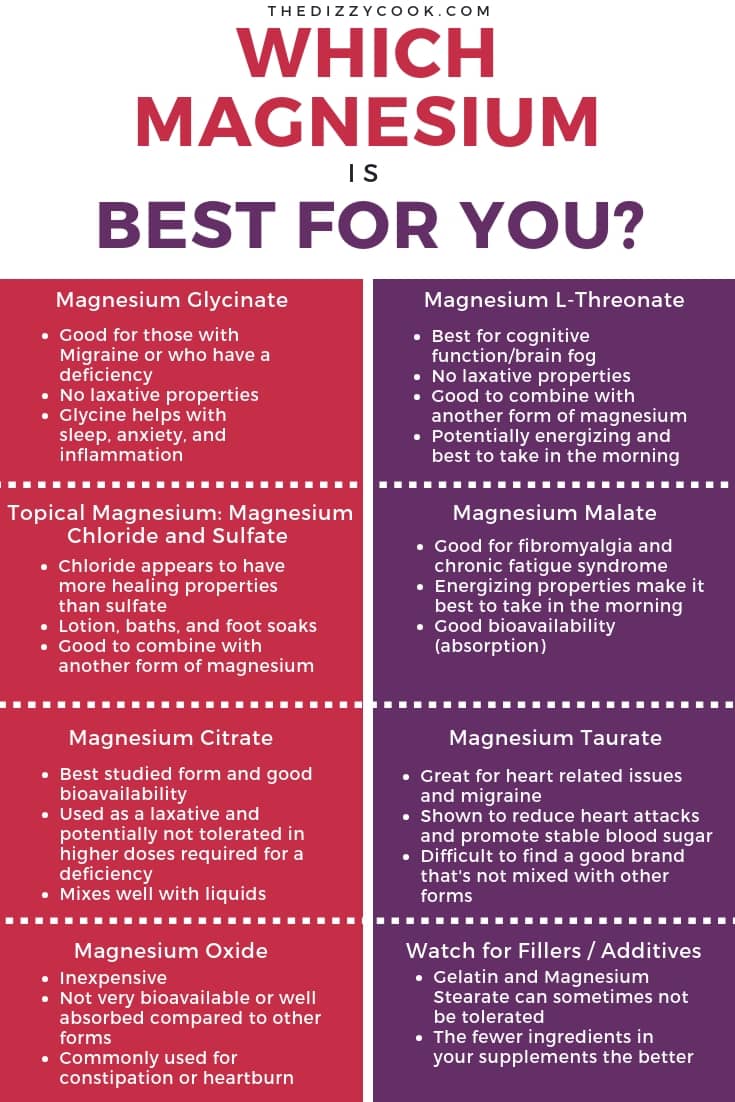
Magnesium Posts
For more helpful information on magnesium and other supplements for migraine, check out these articles.



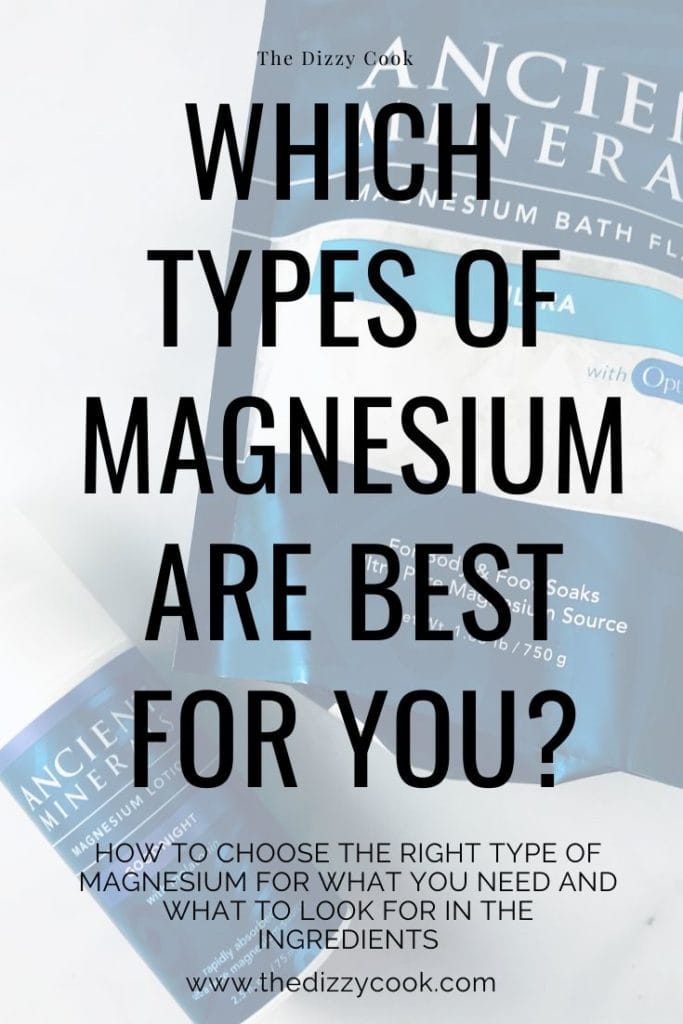
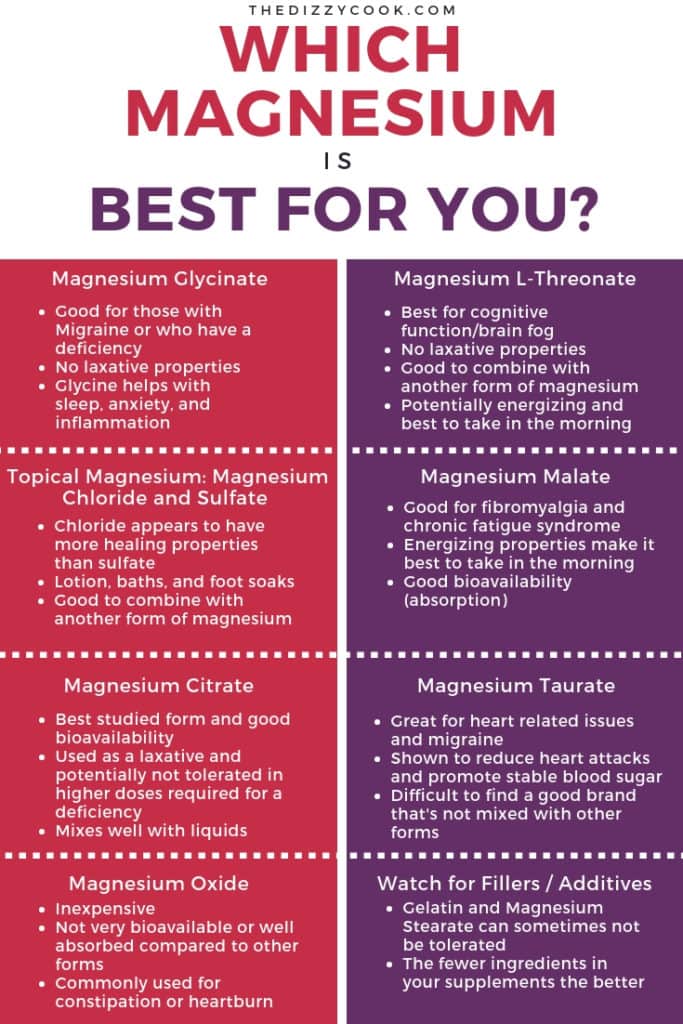
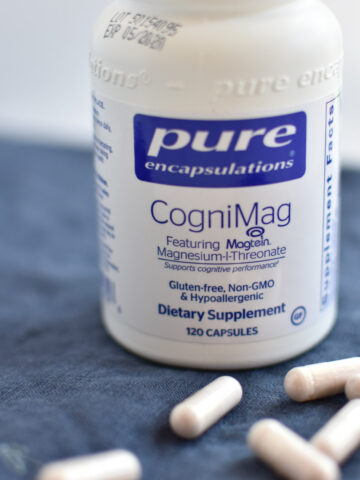
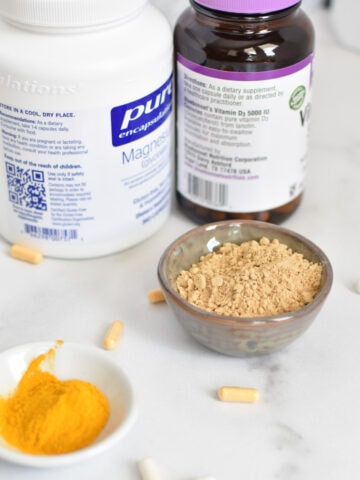
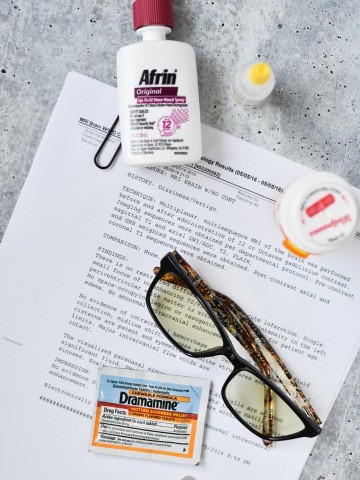


Greetings Alicia,
I read your journey as you experienced VM. I been searching and been to many doctors.
Some of the symptoms I am having are chronic swaying/rocking 24hrs a day nonstop. This is all day long it doesn't go away until I fall asleep. When I am on the grass it feels like I am sinking/ walking on marshmallows. This has cause me to be stress and very irritable. I get out walking and shopping. However, I am tired, tired, tired. I try to be optimistic. I take magnesium 250mg looking at the ingredients it has fillers- 1st ingredients are cellulose gel, croscarmellos sodium, stearlic acid, Magnesium stearate.
Which Magnesium is best?
Hi 🙂 which brand did you recommend for magnesium citrate?
Hey I take the pure encapsulations one personally!
Hi there! Thank you for this very helpful article. I have been dealing with chronic headaches for 17 years and just this year due to the help of a DO focusing on fascia and inflammation am finally seeing improvement. My general doctor told me to take riboflavin and magnesium (with no other info on what type/how much) and I have been researching more on the filler ingredients and noticed both my brands (Health By Principle-Mag and Forest Leaf B2) both have the magnesium stearate included. Would love your thoughts on adding in threonate to my regimen and thoughts on the brand you recommended by Teraputics that also includes magnesium stearate... I am wondering if I should do the Pure Encapulations Glycinate and the Teraputics threonate (since Pure Encapsulations is a bit out of budget). Sorry for the ramble, but I would love your insight on both Magnesium and Riboflavin when you have the time 🙂 Thank you!!
I was taking the lowest amount of Pure Magnesium Glycinate before bed and I also noticed stomach upset and diarrhea. It went away when I stopped taking it. I tried it again just to be sure that it was the magnesium causing the problem and it started up again. Just an FYI for others who may experience this problem.
Are you familiar with the product biOptimers Magnesium Breakthrougth? It has all the forms of magnesium.
I'm not, but I prefer to do individual supplements so you can actually see what's helping. In a combined supplement it's hard to tell if you have a good or bad reaction as to what you might be reacting to.
I am trying that to help me sleep. It is finally helping a little after taking about half a jar, HOWEVER, I recently noticed that I am having way LESS dizzy spells!!! What a Blessing it would be if this supplement helps them stop completely!!
Awesome - so glad it's helping!
I noticed you said the Migrelief formula changed? When did this happen, and was it the type of magnesium that changed? What type did the original formula have?
I need for fibromaylgia and chronic fatigue and osteoarthritis and my back is bad sleep problems
I wonder if you have considered the liquid “ionic” magnesium types?
Supposedly they absorb better and faster without a laxative effect. I have been taking the pure encapsulations glycinate for 5 months now and just recently realized that it still gives me horrible gastric symptoms. I was waking in the morning with sharp stomach pains, gas and the worst gnawing feeling in my stomach! I thought I had IBS but discovered it was the magnesium when accidentally I skipped a week and felt tons better. I’ve heard great things about the ionic types suspended in liquid (“they go straight to the cell! The body is better equipped to use ionic minerals!”) but I’m not sure if it’s all marketing.
I rarely hear this with the glycinate, but it does happen on occasion! Usually people benefit from trying a new brand or type. I've seen a lot of success with threonate for people who are sensitive. You might also be taking too much, so maybe revisit that with your doctor as well if you think that could be the case. The ionic appears to be made with chloride so I'm not sure if that would actually be better for a sensitive stomach. Generally chloride is used in soaks and topically (a good option for you too!). You will just have to try it out and see what may work better.
Thanks for your quick reply-for now I am using the ancient minerals topical spray which works miracles when sprayed in the neck during an attack. I might try another brand. Sadly my neurologist is not very open to supplements or knowledgeable about vertiginous migraines so I’m kind of at a loss for supplementation advice.
Which Ancient Minerals are you using, the original, sensitive, etc. formula?
I use the bath salts mostly and the original lotion!
I went to the Dr last week and he said I was on the edge of being a diabetic. I don't think that I take enough magnesium. Would you recommend the taurate for blood sugar and deficiency? I'm so confused on when to take it! TIA!
Hey Holly, Usually dietary changes are recommended for this - I have a dietician who is an expert in this if you need a suggestion. Magnesium can help with a lot of things but I think it's best to run this by your doctor or dietician. I will say most people find the greatest benefits with migraine with glycinate.
Hi Alicia, I started taking 500 mgs of Magnesium Oxide for my VM. Its been two months and I have noticed a decline in my headaches. Thank God! Only thing is, it does give me a laxative effect. I also have noticed that I feel dizzier in the day. I take all of my supplements in the morning. Magnesium. Riboflavin, CoQ10, and Vitamin D. Do you think taking the magnesium at night might be better? I find sometimes magnesium can make me dizzy. Also, have you tried anything natural to help with dizziness? I've been dizzy for two years. I'm not too keen on taking antidepressants for fear of side effects. Thank you for all of your info. You have been a Godsend.
God Bless!
Hi Nora, Yes I take my glycinate at night and cognimag in the morning. There are lots of natural treatments you can try! Just keep scrolling down to the bottom of the post at that link. Also you may want to look into vagus nerve stimulation as well. But there are so many more medications out there than just antidepressants. You can check out my treatment plan for a few options and then on youtube, listen to the videos with Dr Beh.
I have been taking the Pure Magnesium Glycinate and the Magtein L-Threonate per your recommendations for a year with no problems. I just had acdf surgery and now I can not swallow any pill especially capsules this size. I see you have a power for glycinate although not from your store. I can get the powder you have a link to and that would be great but I don't see any powder anywhere for L-Threonate. I have been emptying the capsule and it's just not working. Horrible taste and I can't avoid missing some in the drink. Is there a power you recommend for that? If not, I found a brand that has both but I have no idea how to determine if it is a good product or how much to take. It is at https://www.amazon.com/gp/product/B081TKGV1J/ref=pe_27542530_636526490_em_1p_3_lm#customerReviews Is there any recommendations you can make? Thank you in advance.